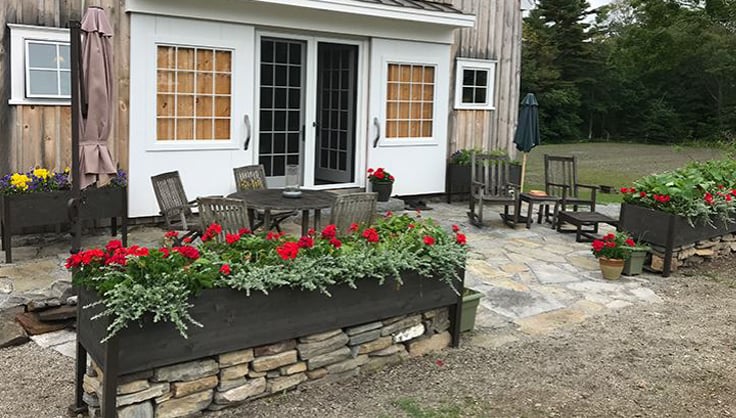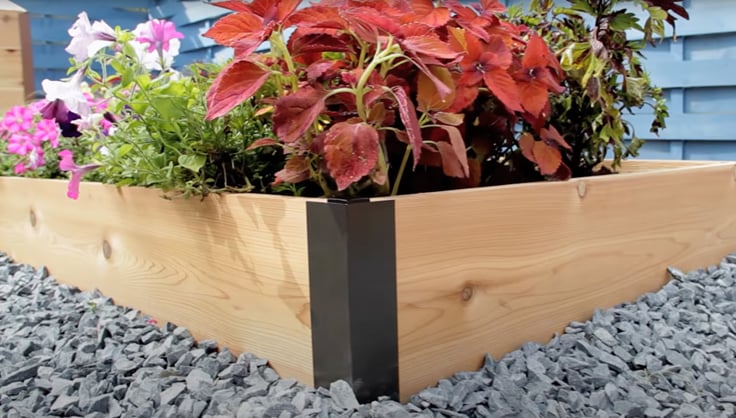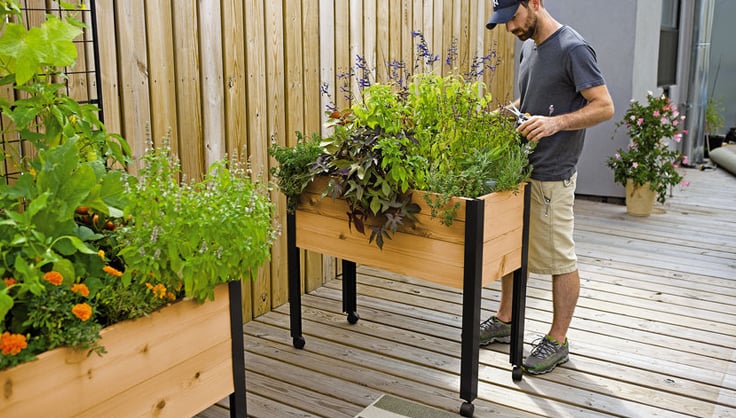Growing Resilience: Creative Solutions Keep Senior Gardeners Comfortable, Active
Meet a Gardener: Toni Gattone
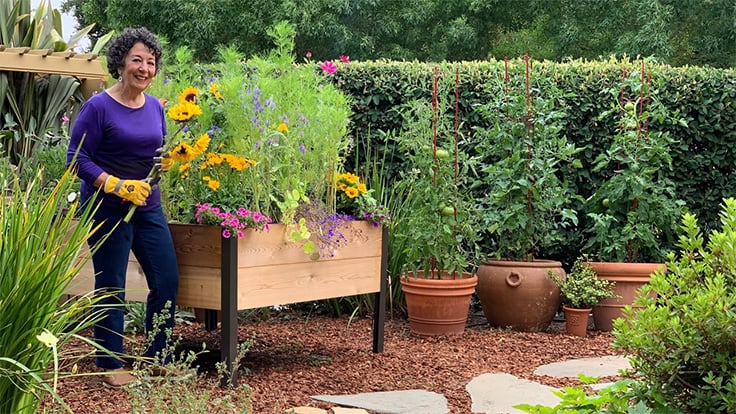 Senior gardening speaker and author, Toni Gattone, grows edibles and ornamentals in the front yard of her Northern California home. Photos: Heidi Hornberger.
Senior gardening speaker and author, Toni Gattone, grows edibles and ornamentals in the front yard of her Northern California home. Photos: Heidi Hornberger.When long-time gardener Toni Gattone's back went out, leaving her trapped on her family room sofa, she found herself feeling desperate to get out and garden. After all, it was time to prune her beloved roses! "Lying there on my back, I asked myself, 'How can I adapt?'"
Little did Toni know that one single question — and the weeks she spent reading and researching adaptive gardening while she recovered on her sofa, laptop perched on her belly — would lead her to a new gardening passion ... and career. Today, Toni is a nationally recognized speaker and author in the in-demand field of senior gardening. She focuses on helping gardeners stay comfortable and active in their gardens, finding new ways of doing things despite the limitations that come with aging or physical injury.
Through her adaptive gardening seminars, her website ToniGattone.com, and her book, The Lifelong Gardener: Garden With Ease and Joy At Any Age, Toni provides inspiration and information on efficient garden planning, emphasizes healthy movements, and offers practical suggestions for everything from garden tools to planting techniques.
"I'm passionate to share gardening solutions that save time, money, space, and above all, energy," Toni explains. "I'm all about comfort, ease, and joy."
How did you get started with gardening?
I grew up in Chicago, where I fell in love with growing roses and vegetables in my grandfather's backyard. After I moved to Northern California and bought my first home, I learned everything from my Mom and Dad, and a lovely neighbor down the block. It wasn't until I became a Master Gardener that I dispelled all their myths — because it's all about research.
Why do you garden?
Gardening for me is the perfect antidote to the news and politics. When I'm gardening it clears my mind of all the craziness, the complicated world we live in these days. It feeds my soul.
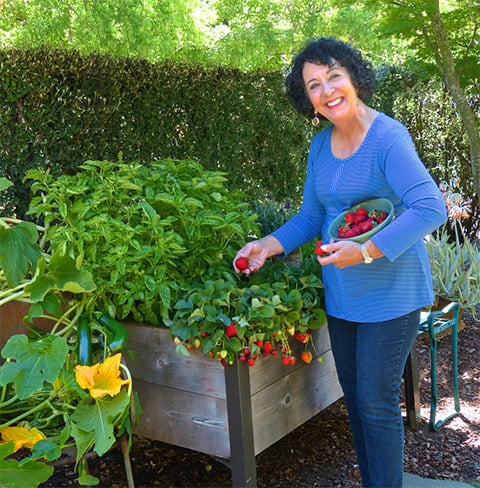 The elevated raised beds in Toni Gattone's garden allow planting, weeding, and harvesting without bending, and help her prevent back pain.
The elevated raised beds in Toni Gattone's garden allow planting, weeding, and harvesting without bending, and help her prevent back pain.What kinds of gardening do you enjoy?
I was always into growing roses — thank you, Grandpa! — and I loved bringing in flowers for bouquets. Once I began growing lettuces, salad greens, and tomatoes, I fell in love with fresh salads. My husband and I also grow vegetables but we're limited by our small space; we can't grow large plants like pumpkins or figs.
I like combining edibles with ornamentals for that pop of color. I suggest combination planting to my audiences because it can be a bridge from ornamentals to edibles. If you're not growing your own food, why not? There are so many reasons why you should. Combination planting is an easy way to "dip your toes in."
Describe your own garden.
We live on a tiny property, and our front yard is only 15 feet deep. We have a couple of raised beds that are easy on the back: One is elevated and one needs to be! I find that regular raised beds are great, but you've still got to get down there to work. Waist-high, elevated raised beds are the way to go. You can sit down or stand up without severe bending.
I like to look for every opportunity to garden vertically, on a wall or in window boxes. It makes all the sense in the world: You can stand up and do all your work. I also have lots of containers and a few garden beds, mainly for groundcover, shrubs, and trees.
How did you develop your specialty of adaptive gardening?
After I became a Master Gardener, I was looking for a way to give back. I was asked to be their public seminars co-chair, and my first project was teaching edible landscaping to our community. When I started teaching, I noticed the average age groups in my classes were seniors. I live in Marin County, one of the oldest counties in California, where 27 percent of our people are 60 years or older.
Then my back went out and I suddenly couldn't garden. I started researching while it healed, because I knew I would need to adapt my own gardening techniques. I learned that 78 million Baby Boomers become seniors every year — 10,000 Baby Boomers become seniors every day, so it's good to know we are not alone and our motto is: Never Give Up! I was intrigued by this aging population. I wanted to help gardeners find creative solutions so that they could grow resilience. If your body doesn't work due to physical challenges or mobility issues, there's always another way to get it done.
What do you feel are the biggest benefits of gardening?
First, there's stress reduction. When you're out there, the only thing that matters is what's going on with that plant in front of you. Your worries and problems just slip away.
Exercise is also important. Gardening gets you out and moving. Especially for senior gardeners, it's important to do some stretching, or even dancing, before you get started to help your body warm up. It's also good to switch it up in the garden by changing chores, so you aren't using the same muscles for an extended period of time.
What's your biggest gardening challenge?
It used to be deer — we have deer that walk down the street like they own it, so now all the plants they like are behind fences and gates. But recently it's critters and pests like squirrels, birds, and slugs. They've all found my garden so I can't plant new starts or seeds without bird netting. I use the University of California Integrated Pest Management website to help diagnose and fix problems.
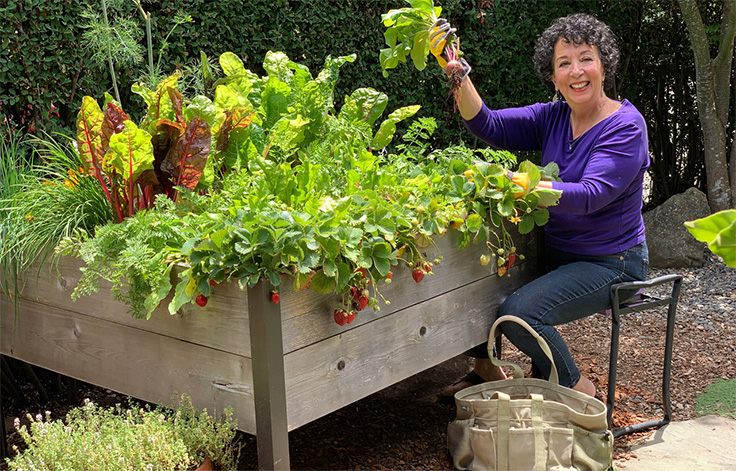 Toni Gatttone always wears gloves when gardening. They protect her skin from bumps, scrapes, and damaging UV rays.
Toni Gatttone always wears gloves when gardening. They protect her skin from bumps, scrapes, and damaging UV rays.What is your most memorable gardening triumph or disaster?
My Mom played a strong role in my life. She and I were like two old shoes. After she passed, we used some of the money she left to remodel our gardens in front of the house, knowing she would approve.
I've had quite a few disasters, but I would have to say the worst was when we lost a large blue spruce during a storm and I planted bamboo in its place. What was I thinking? It kept spreading, and spreading … it took a couple of seasons and a hori hori knife to get rid of all the roots. Never again!
How have your gardening practices changed through the years?
I'm not as concerned about doing it right. Sometimes I just want to try something different and if it works, fine. If not, oh well! That's the joy of gardening; it's constant trial and error.
I think all gardeners need to prepare ourselves and have a consciousness about what we're doing. How can you take care of yourself, so you can take care of your garden? It's okay to not garden all day, or in the hot sun. I use the Italian word, basta, which means, "Enough!" Done is better than perfect. "Less is more" is a huge concept that I think benefits everyone. Unless you have lots of energy, lots of space, lots of time ... then go for it!
What are your gardening best practices?
I always wear gloves when I garden: I'm Italian so I talk with my hands a lot and I get manicures, so I try to take care of them. As we age, our skin gets thinner and is more susceptible to damage from bumps and scrapes, not to mention the sun. I use three different pairs of gloves — rose gauntlets to protect my arms, work gloves for heavy work, and everyday gloves for weeding.
What is your favorite garden tool?
I have so many specialized tools that I use and love — soil scoops, tool sharpeners, pruners. Every tool has to fit my hand, and be comfortable to use.
My favorite Gardener's tools are the Lightweight Hoses and the Gardener's Puddle-Proof Tote. The Lightweight Hoses save me lots of time and energy. I've replaced all of my hoses with these. I'm a small person, only 5'1", and all the hoses I had were heavy. I was always wrestling with them, and worrying that I could throw my back out again. And I love the Gardener's Puddle-Proof Tote. It's really well-made and when I go to a Master Gardener event, I've got room in there for everything I need.
I also like to use umbrellas as a fun and fast way to protect plants from frost. We don't often get a freeze where I live, but I do group together any plants that might be freeze-sensitive. Umbrellas are lightweight, and they can tuck between plants to keep the frost off. They're a convenient addition to frost cloths and don't take up space when stored. If I go to a garage sale, I pick up extra umbrellas to protect my "babies."
Have any of your friends been bitten by the gardening bug?
Yes, for sure. It's a joy to share the love of gardening with them. People hear I'm a Master Gardener and they assume I'm going to have all the answers. My biggest problem is that I was certified post-menopause, so I've already forgotten half of what I've learned!
How did you discover Gardener's Supply?
I've been a client for many years. Every seminar I do, I refer people to the Gardener's website. I can count on Gardener's quality — I know they'll stand behind what I buy — and I love that they offer free freight on a pretty regular basis. Freight to California can add up.
Is there anything else you'd like to tell Gardener's Supply Company's readers?
I teach people how to adapt their gardens and one of the first things everyone needs to do is, bring it up! Garden up with raised beds, containers, and as many vertical gardening opportunities as you can find. It will keep you keep you gardening for life in comfort and safety.
Learn more about Toni at her website, ToniGattone.com. Her book, The Lifelong Gardener: Garden with Ease and Joy at Any Age, published by Timber Press in August 2019.
Last updated: 03/08/2024
Print this Article:
Related Articles
Get the Dirt
Stay up to date on new articles and advice. Please fill out the information below.

